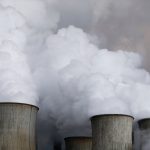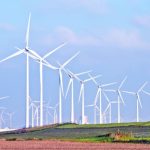The Companies That Are And Aren’t Setting Strong Clean Energy Targets
At a time when the Trump Administration is trying to undo as much clean energy and climate regulation as it can, many corporations are traveling in a different direction. There’s a distinct divergence between government and Fortune 500 these days on renewables and global warming, and, in turn, a divergence between Trump, mainstream financial markets, and much of global public opinion.
Recently, we’ve seen iconic companies like Apple, Bank of America, Facebook, Google and Walmart make commitments for 100% renewable power (mostly solar and wind). And we’ve seen hundreds of others adopt Science Based Targets for climate change–that is, targets that accord with internationally agreed goals for reducing greenhouse gasses. We don’t know what long-term impact Trump’s climate-obliviousness might have–whether, for instance, it will normalize denial within American business–but so far he seems to have less dire consequences than environmentalists feared last November.

“There’s real liability in being associated with the climate denial of this administration, in particular for the consumer sector,” says Anne Kelly, policy director at Ceres, a nonprofit that works with investors and companies to promote sustainability, in an interview. “What’s encouraging to me is the companies have stood up and said ‘no, we’re keeping our goals in place, we want to stay in the Paris Agreement, it’s going to make us competitive if we support low-carbon policies’.” More than 1,000 companies and investors have signed the “Business Backs Low-Carbon USA” pledge calling on Trump to help limit global temperatures below an increase of 2 degrees Celsius and for a continuation of the Obama Administration’s Clean Power Plan.
Having said that, a new report from Ceres, WWF, Calvert Research & Management and CDP (the Carbon Disclosure Project) shows that progress on clean energy and climate goals is far from uniform. It’s true that many companies with no great love for Obama or Democratic politics are heavy investors in renewables and climate change action (companies like Walmart and Mars, for instance). But then commitments across wider American business vary widely. About half the 2016 Fortune 500 have set targets to reduce greenhouse gasses, or increase their energy efficiency or to up their sourcing of renewable energy. But that’s only a 5% increase compared to a previous report in 2014. While Apple, Bank of America and Facebook are making headlines, a lot of companies are still sitting on their heels.
The report shows big gaps between industries. At one end, 72% of consumer staples giants (like Procter & Gamble) have made one of the three types of commitment (energy efficiency, climate or renewables). But, at the other end, only 11% of energy companies have one or more target, down from about 25% three years ago. (Some companies, like Chevron, Tesoro Petroleum, National Oilwell Varco, Devon Energy and Marathon Oil, have actually dropped targets since the last report.) “There is a lot of awareness among consumers and a lot of demand, and [consumer-facing] companies are responsive to that,” Lance Pierce, president of CDP North America tells Fast Company.

Energy companies often say they need a “level playing field” before setting targets–for instance a regional, national, or international climate agreement that holds all sector companies to the same standard, Pierce says. Whether that’s simply a delaying tactic given that the current administration is unlikely to establish such a playing field is open to debate. Pierce says it could well be “disingenuous,” though he’s generally sympathetic to the complexity and “human fallibility” of big companies.”We understand that companies are fallible human institutions and that they need to get all their team onboard to make it work. On the other hand, a lot of other companies are doing it and setting a high bar for leadership, so there’s no reason why the other companies shouldn’t be doing it, too,” he says.

More positively, 210 companies globally now have science-based climate targets (eg through the Science Based Targets initiative). They include 10 Fortune 500 companies (Procter & Gamble, General Mills and Kellogg’s for instance). Also, 72 Fortune 500 companies have said they intend to set such a target within two years (Walmart is one of those). “They are raising the bar for what a standard should be,” says Kelly. “It’s casting doubt on those who, with good intentions, have set a target that was slightly more random. We’re now at a point where we can have legitimate targets to do with climate science.”
“We should strengthen the renewables available in all 50 states, and deeply invest in research around battery storage and smart grids. The U.S. has invested in major public works in the past, like trains and highways. We need to do the same with modernizing the grid,” Kelly says.
(34)














